Related Research Articles
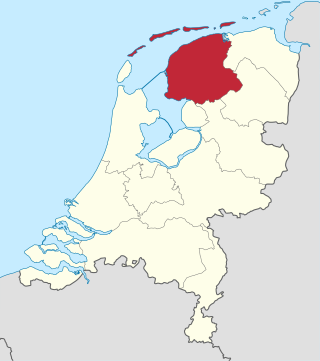
Friesland, historically and traditionally known as Frisia, named after the Frisians, is a province of the Netherlands located in the country's northern part. It is situated west of Groningen, northwest of Drenthe and Overijssel, north of Flevoland, northeast of North Holland, and south of the Wadden Sea. As of January 2023, the province had a population of about 660,000, and a total area of 5,753 km2 (2,221 sq mi).
The Frisians are an ethnic group indigenous to the coastal regions of the Netherlands, north-western Germany and southern Denmark, and during the Early Middle Ages in the north-western coastal zone of Flanders, Belgium. They inhabit an area known as Frisia and are concentrated in the Dutch provinces of Friesland and Groningen and, in Germany, East Frisia and North Frisia.
The history of the Netherlands extends back long before the founding of the modern Kingdom of the Netherlands in 1815 after the defeat of Napoleon. For thousands of years, people have been living together around the river deltas of this section of the North Sea coast. Records begin with the four centuries during which the region formed a militarized border zone of the Roman Empire. As the Western Roman Empire collapsed and the Middle Ages began, three dominant Germanic peoples coalesced in the area – Frisians in the north and coastal areas, Low Saxons in the northeast, in addition to the Franks in the south. By 800, the Frankish Carolingian dynasty had once again integrated the area into an empire covering a large part of Western Europe. The region was part of the duchy of Lower Lotharingia within the Holy Roman Empire, but neither the empire nor the duchy were governed in a centralized manner. For several centuries, medieval lordships such as Brabant, Holland, Zeeland, Friesland, Guelders and others held a changing patchwork of territories.

Year 689 (DCLXXXIX) was a common year starting on Friday of the Julian calendar. The denomination 689 for this year has been used since the early medieval period, when the Anno Domini calendar era became the prevalent method in Europe for naming years.
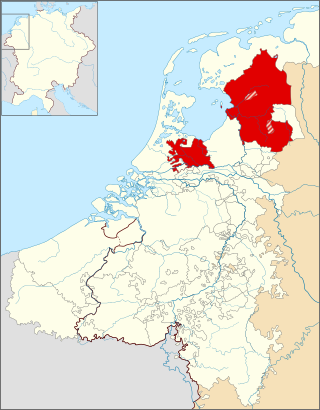
The Bishopric of Utrecht was an ecclesiastical principality of the Holy Roman Empire in the Low Countries, in the present-day Netherlands. From 1024 to 1528, as one of the prince-bishoprics of the Holy Roman Empire, it was ruled by the bishops of Utrecht.

Wijk bij Duurstede is a municipality and a city in the central Netherlands.
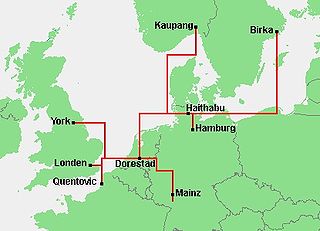
Dorestad was an early medieval emporium, located in the southeast of the province of Utrecht in the Netherlands, close to the modern-day town of Wijk bij Duurstede. It flourished during the 8th to early 9th centuries, as an important port on the northeastern shipping routes due to its proximity to the fork in the Rhine, with access to Germany via the Nederrijn, to the southern Netherlands, northern France, and England, and to the northern Netherlands, northern Germany, and Scandinavia.
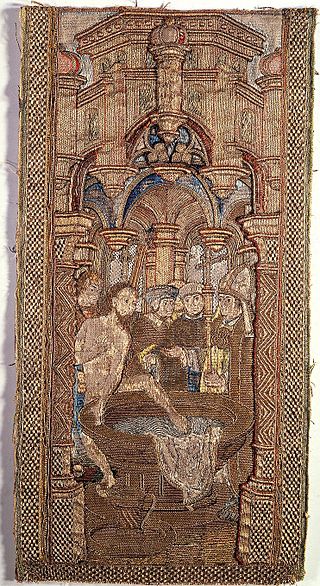
Radbod was the king of Frisia from c. 680 until his death. He is often considered the last independent ruler of Frisia before Frankish domination. He defeated Charles Martel at Cologne. Eventually, Charles prevailed and compelled the Frisians to submit. Radbod died in 719, but for some years his successors struggled against the Frankish power.

William II was Count of Hainaut from 1337 until his death. He was also Count of Holland and Count of Zeeland. He succeeded his father, Count William I of Hainaut. While away fighting in Prussia, the Frisians revolted. William returned home and was killed at the Battle of Warns.

The County of Holland was a state of the Holy Roman Empire and from 1433 part of the Burgundian Netherlands, from 1482 part of the Habsburg Netherlands and from 1581 onward the leading province of the Dutch Republic, of which it remained a part until the Batavian Revolution in 1795. The territory of the County of Holland corresponds roughly with the current provinces of North Holland and South Holland in the Netherlands.
The Drenther Crusade was a military campaign launched against the inhabitants of Drenthe with the approval of the Papacy in 1228 and lasting until 1232. It was led by Willibrand, Bishop of Utrecht, commanding an army composed mostly of Frisian crusaders.
Dutch dialects are primarily the dialects that are both cognate with the Dutch language and spoken in the same language area as the Dutch standard language. They are remarkably diverse and are found within Europe mainly in the Netherlands and northern Belgium.
Bubo, also spelled Bobbo, Poppo or Popo, was the pagan duke (dux) of the Frisians in the early eighth century. He is the first ruler whose name is known after Radbod. He did not recognise Frankish supremacy, and his territory probably only encompassed the north of Radbod's Frisia. He was defeated in a short war by the forces of Charles Martel, the duke of the Franks, in the Battle of the Boorne. The Frankish chroniclers, such as the Continuations of Fredegar, Vita Willibroridi of Alcuin and the Annales Mettenses priores, depict Bubo as a rebel and the Frankish invasion as a just war.
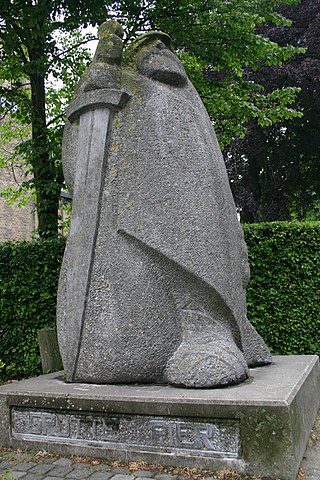
Frisia is a small region in the north of the modern day country known as the Netherlands. In the Iron Age, the ancestors of the modern Frisians first migrated south out of modern day Scandinavia to the south west where they began to settle along the coast. The archeological record goes all the way back to the Neolithic era, however, the first written sources for Frisian history come from Roman records, like Tacitus' account of an unsuccessful Frisian attack on a Roman fort. Frisia would go on to distinguish itself culturally from other Germanic peoples but remained recognizably Germanic nonetheless. In the Early Medieval era, Frisians took the seas with well crafted ships to perform trade and to raid other ports, cities, and towns in other parts of Europe. For most of its modern history, Frisia, or Frysland, has been under the control of the Netherlands but today their language is co-official with Dutch at the provincial level. Frisian is the most closely related language to English aside from Scots.

The Frisian–Frankish wars were a series of conflicts between the Frankish Empire and the Frisian kingdom in the 7th and 8th centuries.

The Frisian Kingdom, also known as Magna Frisia, is a modern name for the post-Roman Frisian realm in Western Europe in the period when it was at its largest (650–734). This dominion was ruled by kings and emerged in the mid-7th century and probably ended with the Battle of the Boarn in 734 when the Frisians were defeated by the Frankish Empire. It lay mainly in what is now the Netherlands and – according to some 19th century authors – extended from the Zwin near Bruges in Belgium to the Weser in Germany. The center of power was the city of Utrecht.
The Netherlands in the early Middle Ages was inhabited by various Germanic tribes, including the Frisians, who played a significant role in the development of the region and its Christianisation and eventual incorporation into the Frankish Empire.
References
- Blok, Dirk P. (1968). De Franken : hun optreden in het licht der historie. Fibulareeks (in Dutch). Vol. 22. Bussum: Fibula-Van Dishoeck. pp. 32–34. OCLC 622919217 . Retrieved 2014-09-17.
- Rogers, Clifford J. (2010). Rogers, Clifford J.; Caferro, William; Reid, Shelly (eds.). The Oxford Encyclopedia of Medieval Warfare and Military Technology, Volume 1. New York: Oxford University Press. ISBN 0195334035.